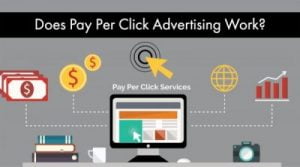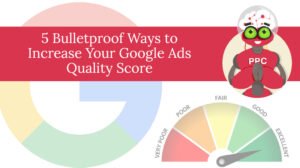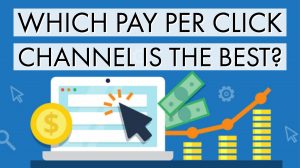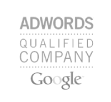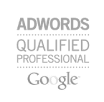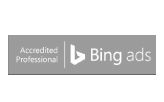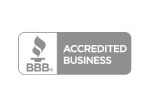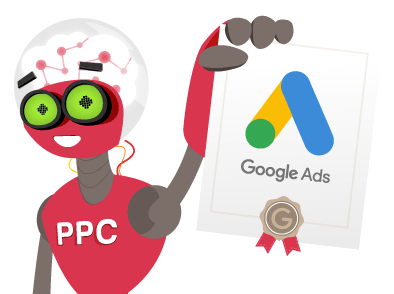Pay-per-click, also known as search engine marketing or paid search, has the power to help your business thrive. Relevant, well-targeted, and successful PPC campaigns through Google ads and appearing on search engines can help you gain brand awareness, generate traffic, and convert leads into paying customers — but only when it's done right.
If you're not reaching your potential market share, it's likely because you're making easily preventable mistakes in your PPC campaign. This could eat up your pay-per-click budget and jeopardize the success of your PPC campaign.
You may be using the right keywords, ad groups, settings, and content in your PPC advertising and search ads, but if you aren't getting quality scores or decent click-through rates, you've yet to enjoy the full potential of PPC. Here are seven possible reasons behind your wasted PPC ad spend:
7 Possible Reasons Your PPC Marketing Strategy Isn't Working
1. Your Budget Is Too Small

Are you new to pay-per-click? You should know that you only get what you put in. While it may sound scary to put together a large budget to spend on PPC ads without knowing if you will see any return, if you set a too-small budget, you won't be able to reach your target audience.
In competitive industries, a limited budget can mean your ads seldom appear, and when they do, they may not be in prime positions to capture user attention. For example, if you're bidding in a high-cost sector like legal services or insurance, setting a budget that's too low could keep your Google ads from competing effectively against others willing to pay more for visibility.
Furthermore, a small budget restricts your ability to perform sufficient A/B testing. A/B testing is crucial for optimizing your search ads and discovering which combinations of headlines, content, and keywords resonate best with your target audience. Without enough budget to test variations extensively, you're likely missing out on finding and employing the most effective ad strategies.
Additionally, PPC platforms like Google Ads use a pay-per-click model where each click on your ad costs money. If your budget is quickly depleted by a few clicks due to high cost-per-click (CPC) rates, your campaign's reach and duration will be severely limited, reducing overall effectiveness.
If you are serious about trying PPC advertising, it's best to come up with a PPC strategy first or hire a PPC agency as they can bring specialized expertise and dedicated resources to your digital marketing efforts, ensuring campaigns are expertly crafted, executed, and managed. Agencies stay abreast of the latest trends and algorithm changes, which means they can optimize your campaigns more effectively, driving better results and ROI. Their experience across diverse industries also provides insights that refine targeting and boost ad performance.
2. Using Your Homepage As Your Landing Page
Using your homepage as the landing page for your PPC campaigns is a common mistake that can significantly hinder their effectiveness. The homepage of a website is typically designed as a general introduction to your company, covering a broad range of topics and services. This lack of specificity can be detrimental when it comes to PPC, where targeted messaging and clear calls to action are crucial.
For instance, if a user clicks on a PPC ad for a specific product like "organic dog food," but lands on a general pet supply homepage, they may struggle to find the exact product they were interested in. This can lead to confusion, frustration, and a higher likelihood of the user leaving the site without making a purchase. The homepage simply has too many distractions and doesn't directly address the user's immediate needs or the intent behind their click.
A dedicated landing page, in contrast, can be tailored to match the advertisement, with content that reinforces the ad's message, a clear call to action (like "Buy Now" for product sales or "Sign Up Today" for newsletter subscriptions), and a streamlined design that guides visitors towards making a conversion. By directly addressing the user's expectations set by the ad copy, use a relevant landing page that's specifically linked to search intent. If you don't have one, create a new landing page for every ad group. It will improve your conversion rate and will also give you higher rankings.
3. Using The Wrong Keywords
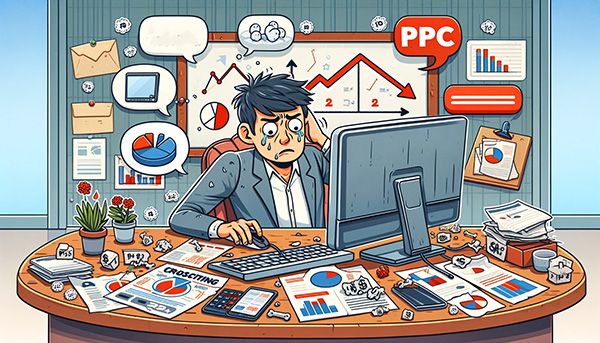
Choosing the wrong keywords for your PPC campaign can drastically reduce its effectiveness, leading to poor conversion rates and wasted ad spend. Keywords are the linchpin of PPC; they need to align closely with the intent behind potential customers' searches.
For example, if a luxury watch retailer uses broad keywords like "watches" instead of more specific ones like "luxury men's watches," they might attract a lot of traffic looking for cheap or women's watches, which does not meet the campaign’s target audience or intent. While you can use all the keywords that are relevant in your industry, but only a small number of them (12%) will lead to conversion rates and generate ROI. The 88% non-performing or less-performing keywords? They'll make you lose 61% of your ad marketing budget and lower your quality score. To avoid that:
Stop bidding on broad match or phrase match keywords. You'll wind up competing with big brands that have established customers.
Eliminate budget-sucking keywords that don't bring in traffic or lead to conversions. Stick to exact-match keywords for the most effective results.
Use negative keywords to exclude specific words or phrases from your ad to avoid racking unwanted impressions and increase the likelihood of conversion.
Using overly broad or irrelevant keywords can lead to high bounce rates as visitors quickly realize the content doesn't meet their expectations. On the other hand, highly competitive keywords can drain your budget quickly if they are not converting at a high enough rate to justify the cost. For instance, a small law firm bidding on the keyword "lawyer" might spend a lot without gaining qualified leads, compared to more specific keywords like "divorce lawyer in [City Name]," which are more likely to attract relevant clients.
The right approach involves conducting thorough keyword research, understanding the target audience, and continually refining keywords based on performance data. This guarantees that your search ads are shown to users who are more likely to convert, maximizing the return on investment of your PPC strategy.
Choosing the correct match type will influence your click-through rates and increase conversion rates. For the strategy to work, avoid low-performing keywords, double your spending on high-value keywords, and put the 80/20 rule to good use. It will create a better user experience, improve your quality score, and ultimately increase your market share.
4. Your Ad Copy Isn't Compelling Enough
The average attention span of humans is 8 seconds.
Do you know what that means?
You have a really short window to persuade your prospects to click on your ad. To get their attention, you'll have to demonstrate that you can provide value in your copy.
Compelling ad copy is essential because it serves as the initial interaction between your campaign and prospective customers. It needs to immediately grab their attention, convey the value of your offer, and prompt them to take action. Our tip? Don't oversell yourself. Grab your audience's attention with engaging and compelling ad copy that presents them with a solution to their pain points. Use keywords and an appropriate CTA to convince them to click on the ad.
For instance, consider if you were managing a PPC campaign for a weight loss program. If your ad simply states "Join Our Weight Loss Program," it may not resonate much with your audience. However, transforming this into "Lose 10 Pounds in 30 Days with Our Proven Plan – Join Now and Start Seeing Results!" provides a specific, compelling promise that directly addresses a common desire among the target audience.
Additionally, your ad copy should feature compelling calls to action (CTAs) that motivate users to click. Urgent, action-oriented language can significantly enhance the effectiveness of your ads. Phrases like "Book Now and Save 20%" or "Limited Time Offer—Register Today!" can create a sense of urgency, prompting quicker decisions and potentially increasing your conversion rates.
Create different versions of the material and conduct A/B testing. It will help you determine which version has better impressions and a higher chance of increasing ROI. Constant testing and optimization of your ad copy are essential. Regularly tweaking phrases, testing different benefits or CTAs, and adapting based on performance data can help refine your approach and improve the impact of your PPC campaigns.
5. You Haven't Optimized Your Google Ad Account
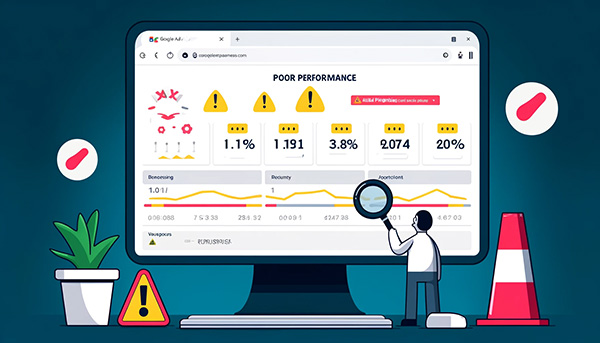
Did you know that you have to optimize your ad account to be more profitable?
Most people don't realize this, but pay-per-click campaigns are not a one-and-done deal. You must refer to metrics, conduct tests to evaluate data spending, use high-performance keywords, add negative keywords, and tweak your ad settings and ad group structure. This can spell the difference between good and awesome conversion rates.
For example, neglecting to refine or expand keyword lists can leave your campaigns stagnant or overly broad. If you're only using generic keywords, you might miss out on lower-cost, high-intent opportunities found in long-tail keywords. On the other hand, neglecting to incorporate negative keywords can lead to your ads showing up in irrelevant searches, depleting your budget without boosting conversions.
An organized account structure will allow you to gain more control over your bidding and redistribute your budget. This can help you get better click-through rates, increase product visibility, ad rank, and quality scores, and avoid wasted PPC ads spend.
Bid strategies also require continual optimization based on campaign performance data. Sticking with a default bidding strategy without considering alternatives based on actual performance can lead to inefficient spending. For instance, switching from manual bidding to an automated strategy like Target CPA (cost per acquisition) could potentially improve ROI by automatically adjusting bids to meet conversion goals at a set cost.
Lastly, ad rotation settings and ad extensions are often overlooked. Proper management of these settings ensures that the most effective ads are shown more often and that additional information (like phone numbers or links to specific pages) is available to improve user engagement and click-through rates.
6. Your PPC Stopped Converting
Google Analytics allows you to track the number of visitors who come to your site but do not engage in any actions. If your ads have an amazing click-through rate that helps bring traffic to your business but doesn't convert, they are not doing the work they're supposed to.
This could be due to a number of reasons, such as:
Your website is hard to navigate.
Your website loads slowly.
You have not optimized your landing pages.
Your ad copy is not compelling.
You're not using the right relevant keywords.
Your contact information — such as phone number or email address — isn't updated.
Your website isn't mobile-responsive.
You've changed your website but failed to update your Google Click ID (GClid)
To ensure these small mistakes don't hinder your ad campaign, review your website and use the right URLs for landing pages. This will improve the customer experience, help you maximize conversions, and boost your website's search engine optimization.
7. You're Not Using Ad Extensions

Is your ad failing to generate the number of impressions you want? Instead of paying more for ads, optimize them with extensions. Neglecting the use of ad extensions in your PPC campaigns can significantly reduce their effectiveness, potentially leading to lower conversion rates. Ad extensions enrich your ads by offering extra information and more opportunities for potential customers to interact directly with your business from the search results page.
For example, if you’re running a PPC campaign for a local service, using location extensions can show your business address directly within your ad, making it easier for potential customers to find your physical location. Similarly, call extensions incorporate a phone number into your ads, enabling mobile users to call your business with a single click.
Additionally, site link extensions provide extra links within your ad that direct users to specific pages on your website. This could be a link to a contact form, a special promotion page, or popular product categories. Using these effectively can guide potential customers through a more tailored funnel, thereby increasing the likelihood of conversion.
Ad extensions can make you stand out on Google search engine results pages (SERPs) by putting the spotlight on your ad. They can expand your advert with extra information about your product or service, such as website links and contact details, improving visibility. They help the client get what they're looking for and increase click-through rates and conversions — without paying a single cent more.
Related Posts You Might Want To Read

